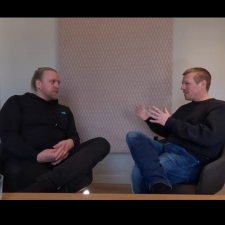While their 10 week quest to spread a message of sustainability while visiting games studios across Europe may be over, there's still plenty to learn and enjoy from the videos that CEO of Matchmade Jiri Kupiainen and GamesForest.Club's Maria Wagner made along the way.
We followed them week by week - click here to see the series in full - as they documented their travels with exclusive video interviews with the big-name studios they visited.
Their message is a simple one. Unless we all get smarter about the necessity and logistics of our business travel, the global turnaround in CO2 production that we're all praying for isn't going to happen.
Here's part one of their video from Sweden, featuring Daniel Hasselberg, CEO of MAG Interactive and David Olsson of We Don’t Have Time.
Jiri Kupiainen: "If you’ve been successful enough to have huge amounts of people playing your game, you have solved way harder problems than that", said Daniel Hasselberg, CEO of MAG Interactive when we talked about estimating the emissions impact of people playing your game. I couldn’t agree more.
The difficulty in estimating gameplay-related emissions is something many people we interviewed brought up as an obstacle to reducing their emissions footprint. Luckily, there seems to be a race between the various organizations that care about the climate impact of the games industry to develop The Perfect Calculator for estimating the emissions from people playing your game. But honestly, it’s not that hard.
A power consumption meter that plugs in between the wall socket and a cellphone charger costs about ten euros. Charge a phone full, play your game for 15 minutes, and measure how much energy it takes to charge the phone full again - that’s about how much energy is consumed when someone plays your game for 15 minutes. It takes about 30 seconds of googling to find the greenhouse gas emission intensity of electricity generation in different countries (here’s a link - saved you 30 seconds!). Take these numbers and your analytics data for number of players and session lengths in different countries, throw all of those into a spreadsheet, and there’s your fairly accurate estimate of how much CO2 is emitted when people play your game.
The reality of climate change is that it’s not data or solutions that we lack, but leadership. In the first part of our Sweden episode (video above) we talked with Daniel about taking responsibility and doing what you can even if it’s not perfect. I hope to see more of this attitude in our industry, but I think many leaders lack the motivation to make climate change a priority item for their company. This is where our second interview with David Olsson comes into play. His company - aptly named “We Don’t Have Time” focuses on using the power of social media to make leaders accountable by praising those who do the right things, and punishing those who don’t.
The EU is taking baby steps towards making emitters pay more, and this will eventually put emissions on the list of strategic priorities for any CEO. But EU politics moves at a glacial pace - certainly slower than the melt rate of our actual glaciers - and we don’t have time.
Perhaps naming and shaming gets us there faster.























